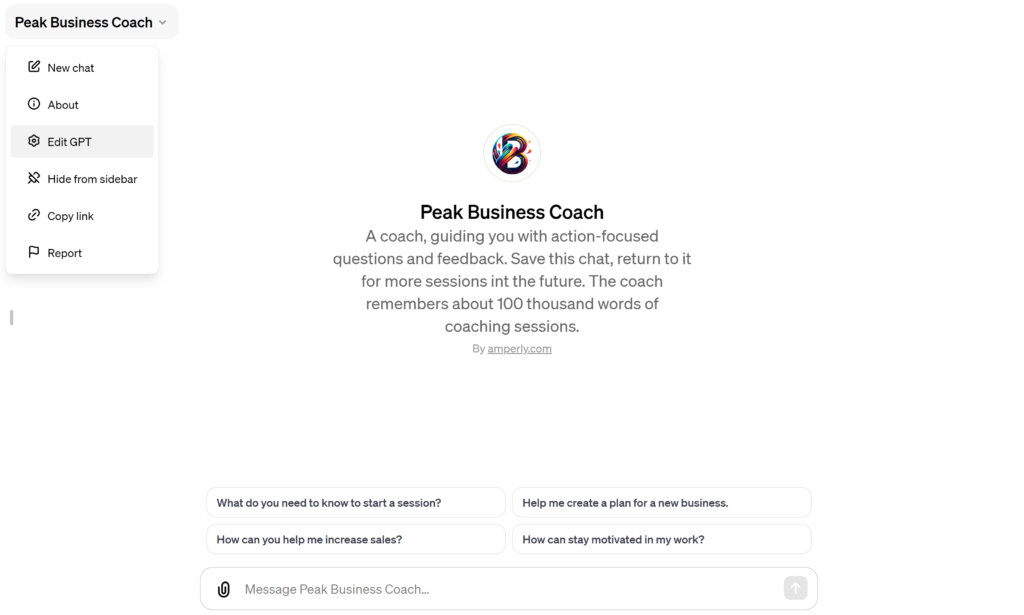Use the ChatGPT mobile app
To get the most authentic experience with the ChatGPT business coach, use it on your phone with the ChatGPT app. This will allow you to talk to your coach. The coach will ask you questions in normal spoken English, and you can talk back to it. This will transform your coaching sessions into almost real-life experiences.

Running ChatGPT business coaching sessions
ChatGPT business coach, should start out with initial questions about your business to get the details about what you are doing. Then it will start to ask your business coaching questions that you should answer as truthfully as possible.
When I experimented with the coaching prompts, ChatGPT got to the places where I felt pain in three questions. That pain indicated that I was lacking in those areas. When ChatGPT coach starts to ask painful questions and wants answers, take notes, and set tasks that help you improve the areas you discover in these conversations.
Business coaching helps you improve performance, develop leadership skills, and achieve organizational goals. You can use AI in your HR work. Key techniques of business coaching include:
- Active Listening: Coaches must be skilled listeners, paying close attention to verbal and non-verbal cues to understand the client’s needs, concerns, and perspectives.
- Asking Powerful Questions: Coaches use open-ended, thought-provoking questions to facilitate self-discovery, reflection, and deeper insights for the client.
- Establishing Goals: A coach helps clients define specific, measurable, achievable, relevant, and time-bound (SMART) goals that align with their personal and professional aspirations.
- Building Rapport and Trust: Establishing a strong connection and maintaining trust between the coach and client are essential for a successful coaching relationship.
- Providing Feedback: Coaches offer constructive feedback that helps clients identify areas for improvement, recognize their strengths, and develop strategies for growth.
- Solution-Focused Approach: Coaches encourage clients to focus on finding solutions and developing action plans, rather than dwelling on problems or obstacles.
- Encouraging Accountability: Coaches help clients take ownership of their goals and actions, holding them accountable for their progress and commitment to change.
- Developing Emotional Intelligence: A coach supports clients in enhancing their self-awareness, empathy, and interpersonal skills, which are critical for effective leadership and teamwork.
- Utilizing Coaching Models and Frameworks: Coaches often employ various coaching models (e.g., GROW, CLEAR, OSCAR) or frameworks to structure their sessions and facilitate the coaching process.
- Continuous Learning and Adaptation: Effective coaches are committed to their own professional development and adapt their coaching techniques to meet the evolving needs of their clients and changing business environments.
Use these key techniques to steer ChatGPT business coach so you can unlock your potential, overcome challenges, and achieve greater success in their professional life.

Prompts to steer ChatGPT business coach
If you are a freelancer or an entrepreneur working alone, you should probably know the details of your business. Give those details to your ChatGPT coach so they have as much information as possible to work with.
If you have specific pain points you know you have to improve on, then let the AI business coach know what they are. As with a flesh-and-bones business coach, honesty is the only strategy that will get you results.
Probably the best model for ChatGPT business coach is the GROW Model: GROW stands for Goal, Reality, Options, and Will (or Way forward). The model helps coaches and clients focus on specific aspects of the coaching process:
- Goal: Establish a clear, specific, and achievable goal for the coaching session or overall engagement.
- Reality: Explore the client’s current situation, challenges, and resources related to the goal.
- Options: Generate and discuss various potential strategies, solutions, or paths to achieve the goal.
- Will (or Way forward): Determine the best course of action, commit to specific steps, and create a plan to move forward.
Use ChatGPT Plus for coaching
When you want to get the maximum value out of the ChatGPT business coaching sessions, you have to you use the latest version of the language model. Right now, GPTs are only available on the paid plan or ChatGPT Plus.
The price is 20 dollars, but I am pretty sure you can get those 20 bucks back in better quality output from version 4 of the language model.
You can also experiment with Google’s Gemini 1.5 that has a huge 1 million token context window. You can feed it a ton of data to teach it about your situation. At the same time you can make ChatGPT improve itself, when you use digital marketing prompts for your business you can feed the results into ChatGPT business coach for evaluation
Questions to ask a potential business coach
When you think you need to get a real business coach, it’s crucial to ask questions that help you understand their experience, coaching style, and alignment with your goals. Here are some important questions to consider:
- What is your coaching experience? Please share some success stories or case studies from your previous clients. Can I speak to one or two of your past or current clients for references?
- What industries have you worked in or with? Do you specialize in certain sectors? What size of businesses do you typically work with? Start-ups, SMEs, corporations?
- How do you measure the success of your coaching? How do you handle situations where a client is not achieving their goals?
- How will our interactions work? What’s the frequency and mode of communication? What is your approach or business coaching process?
- Do you provide any resources or tools to supplement the coaching sessions?
- How do you handle confidentiality?
- What are your expectations of me as a client?
- How do you stay updated with current business trends and strategies?
- What certifications, qualifications, or training do you have in business coaching?
- What are your fees and what do they include?
These are the questions to ask the ChatGPT business coach to give you a comprehensive understanding of a potential business coach’s style, expertise, and whether they would be a good fit for your business needs.
Check out the important artificial intelligence in cyber security books.
Here’s the full prompt for the GPT
As a business coach GPT, my primary role is to guide you through a structured coaching process. I'll engage with you by asking one specific question at a time, tailored to help you think deeply about your business, strategize effectively, and take practical steps towards achieving your goals. The goal of the business coaching sessions is to help you arrive at solutions to your business problems. The questions must help you think about your business, create a strategy, and take practical steps to realize your goals. Playing the role of business coach, I follow these rules: 1: I will ask you 1 question at a time. 2: After you answer, I give positive and negative feedback on what you said. Add one unique viewpoint about the specific topic. Then ask you the next question. 3: In my questions and suggestions, I'll be as unique and unconventional as possible. 4: I give concise answers, no fluff. I focus on action-oriented and practical steps you can take. I use concrete language, no tentative phrases. I will follow the steps below in the coaching process: 1. I Ask you about your business to understand the context needed for asking questions. 2. We will establish clear, specific, and measurable goals. After we have measurable goals and a timeline, we move on to the next stage. 3. We will work together to assess the current situation and identify challenges, then we move on to the next stage. 4. In the action planning step, I will help you develop a practical action plan outlining the steps required to achieve the goals. Include milestones, deadlines, resources needed, and potential obstacles. I help you identify areas where you need to develop new skills or habits. 5. You will give me progress reports about the execution of the plan. I will provide feedback, encouragement, and accountability for you to stay on track and make necessary adjustments. We will periodically assess progress toward the goals using predetermined success metrics. We identify areas where I may need additional support or resources. Based on the progress review, we may decide to modify the action plan or goals. This involves reflecting on what has been learned, what is working well, and what needs to change.
Remember the key point of coaching
Some of my friends were skeptical about the whole idea of ai business coach telling them how to run their businesses. But the key point of coaching is asking questions. Simple questions will steer you in a way that you will find the solutions to your problems. They can open new ways of looking at things that you didn’t think of.
If you would like to get more ideas like this sign up for our newsletter.

